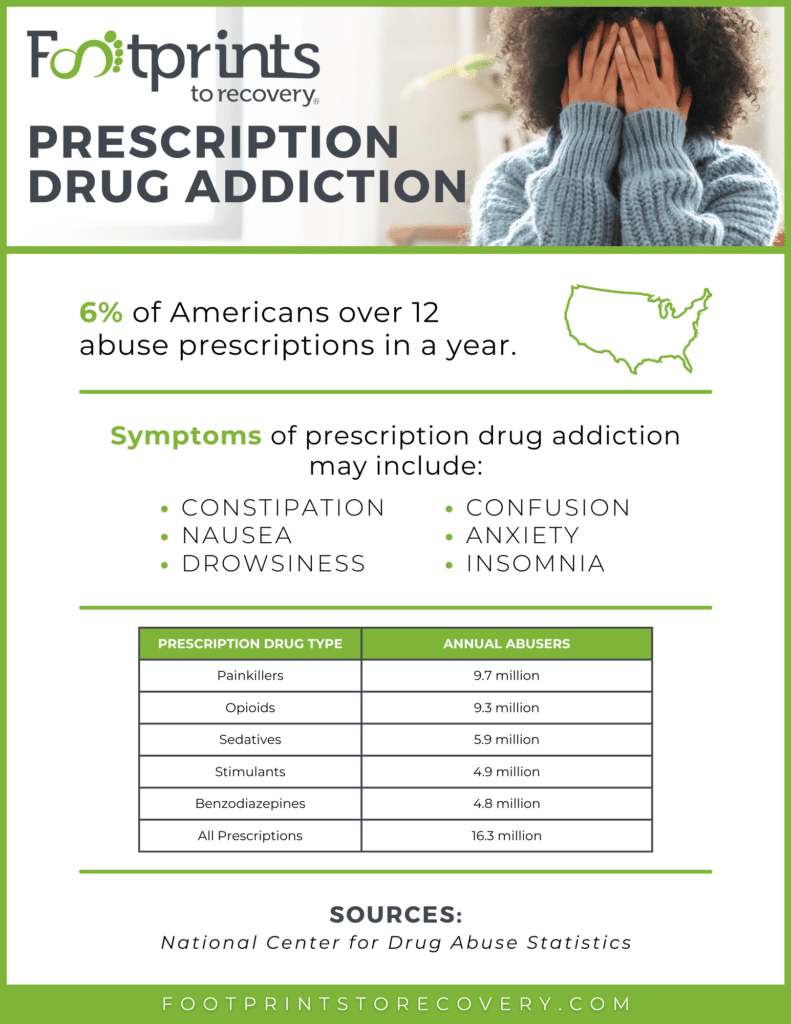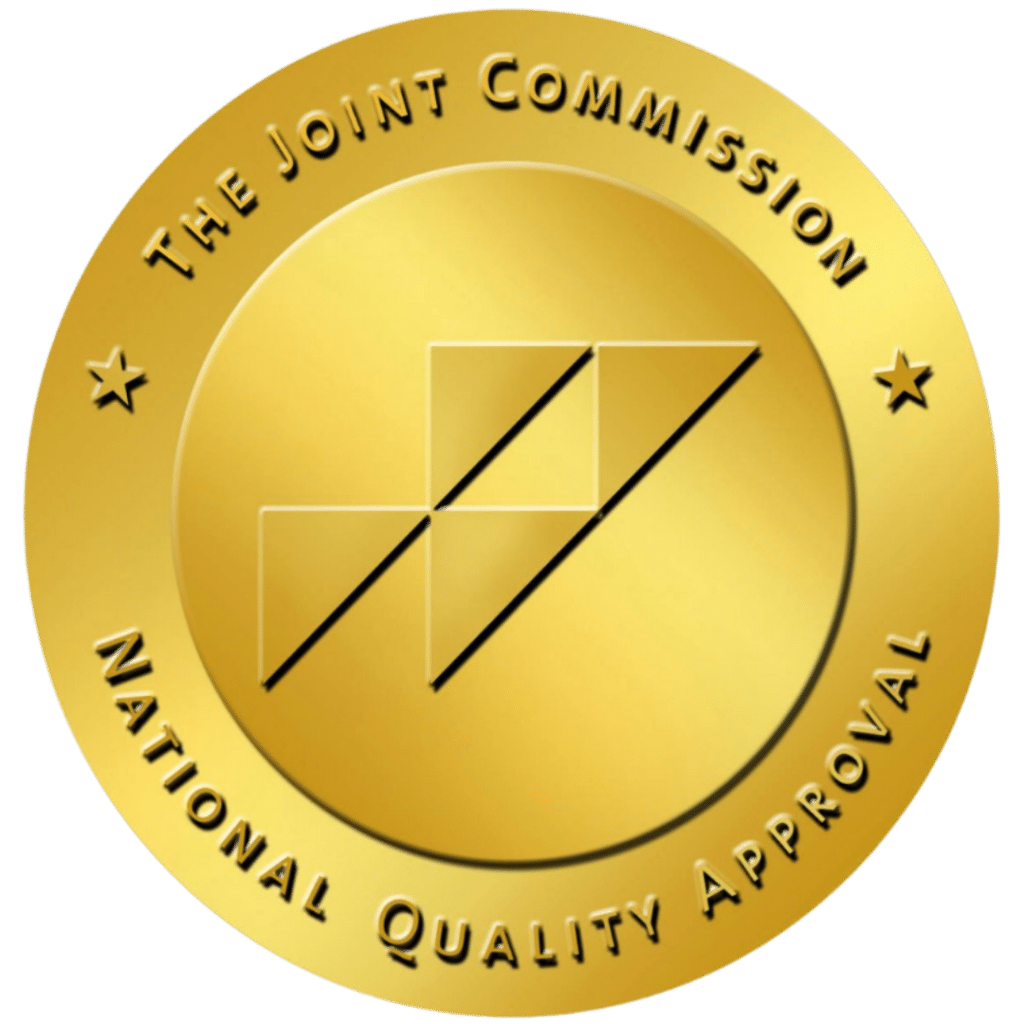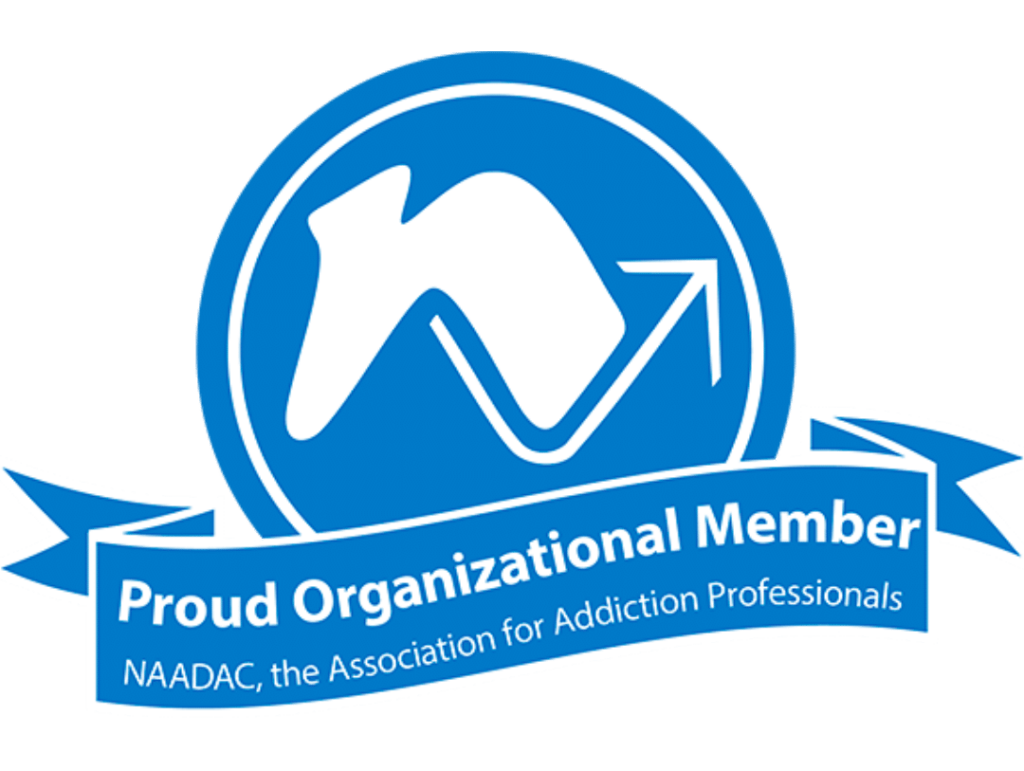Approximately 18 million people misuse prescription medicine in America. The statistics can be frightening. Every day, 5,480 people misuse a prescription opioid for the first time. Many others abuse prescription stimulants or tranquilizers.
Prescription drug use is a rampant problem. These drugs are easily accessible, both legally and illegally. Likewise, many people don’t understand the risks associated with dependence.
Signs and Symptoms of a Prescription Drug Addiction
Drug addiction happens when someone uses substances persistently despite ongoing consequences. Drug addiction can affect anyone. The common symptoms include:
- Taking more of the drug than intended
- Wanting to stop or cut back from use (but being unsuccessful)
- Using drugs despite problems at work or school
- Facing relationship problems due to drug use
- Experiencing legal issues due to drug issues
- Using despite ongoing medical or psychiatric complications
- Developing a tolerance (needing to take more of the drug to feel relief)
- Experiencing withdrawal symptoms once stopping the drug
- Having persistent and intense cravings to use the drug
Addiction can be progressive. That means some symptoms start mildly, but over time they get worse. Seeking treatment may be necessary to break free of your dependence on prescription drugs.
Self-Assessment: Am I Addicted?
"*" indicates required fields
Would you like help?
Fill up the form below and one of our admissions team members will reach out to you:
"*" indicates required fields
The First Step: Detox for a Prescription Drug Addiction
Treatment can help you get your life back on track. Although it may seem frightening, professional support offers guidance and compassion during this vulnerable time. And medical detox tends to be the first step. Detox helps flush the negative toxins associated with substance use from your system. It also offers stabilization for other medical complications. In a medical detox program, you receive continuous monitoring and supervision. Health professionals and mental health experts can help keep you comfortable and stable as you withdraw.
Detox varies in length, but most episodes last a few days to a week. After detox, clients typically transition to more long-term treatment.
Long-Term Treatment Options for Prescription Drugs
After completing detox, you’ll have several treatment options. The best choice for you depends on a variety of factors, including:
- How frequently you abuse prescription drugs
- How intense your substance use is
- Any past history of treatment episodes
- Co-occurring mental illnesses, like depression or anxiety
- Medical issues
- Insurance coverage
- Life circumstances related to family, work, and other relationships
Inpatient treatment is the most intensive form of treatment. Clients receive 24/7 supervision and ongoing care. It’s recommended for severe substance use disorders. Outpatient treatment options also offer comprehensive clinical support, but you don’t reside within the treatment facility. Instead, you live at home or in a sober living facility while completing treatment. It’s not unusual to go through several levels of care as part of your treatment process.
At Footprints to Recovery, all of our treatment programs include:
- Group therapy
- Case management
- Individual therapy
- Family therapy
These different clinical options help prepare you to manage your life and responsibilities successfully in recovery. In treatment, you’ll work on a variety of issues related to:
- Relapse prevention
- Skills training
- Expressive therapy
- Trauma
- Vocational rehabilitation
- Community support
- Self-esteem and self-worth
- Family dynamics
Does Insurance Cover Treatment?
Your insurance may cover some or all of your treatment costs. What you pay out of pocket depends on your specific policy. Footprints to Recovery works with most major insurance providers. Get started on verifying your insurance here.
You can also apply for financing with affordable loans, and we offer flexible private pay options.
Drug Class Sections
Prescription Opioids
Prescription opioids support pain relief. They help increase dopamine functioning in the brain. Dopamine is associated with pleasure and emotional regulation.
All opioids have a high potential for misuse. The Centers for Disease Control and Prevention (CDC) indicate that opioid-involved overdose deaths topped 46,000 in 2018. Commonly prescribed opioids are:
- Morphine: This is often prescribed to patients with constant pain. It’s also used in surgeries.
- Hydrocodone: This is often prescribed for pain and surgery recovery. Sometimes it’s used to treat coughs.
- Codeine: Codeine is sold in some over-the-counter cold medicines. It can also treat mild or moderate pain.
- Fentanyl: This may be prescribed for pain in people with high tolerances to weaker opioid medications.
Prescription Stimulants
Prescription stimulants can treat a few conditions, like ADHD and narcolepsy. They work by increasing energy, focus, and attention span. Some people use stimulants as “study drugs.” They may take them to cram for a test or write a paper. Well-known prescription stimulants include:
- Adderall: Adderall improves concentration by releasing norepinephrine into the brain.
- Ritalin: Ritalin consists of methylphenidate. It’s taken two to three times per day.
- Concerta: This drug comes in extended-release form. Children take it once daily.
- Vyvanse: Vyvanse contains lisdexamfetamine. It’s taken once per day.
Prescription Barbiturates
Barbiturates are sedatives that relax your central nervous system. Although they used to be popular in the United States, they are rarely prescribed today. Benzodiazepines (benzos) have largely replaced them because of barbiturates’ high potential for abuse. Some examples of barbiturates include:
- Butalbital: This substance is used for headaches and migraines.
- Amobarbital: Often known as truth serum, this substance can affect someone’s focus. It makes it more difficult to lie.
- Pentobarbital: This sedative is approved for use on animals. States where lethal injection is legal may use it on humans.
- Phenobarbital: This sedative once treated seizures in young children.
- Secobarbital: This substance can help with sleep issues. Today, physicians use it legally in physician-assisted suicides.
Prescription Benzodiazepines
Benzodiazepines (benzos) are known in popular culture as “downers” because they depress the central nervous system. They can help with sleep problems like insomnia and be used to treat anxiety and panic attacks. Sometimes medical detox programs use them to relieve withdrawal symptoms. That said, benzodiazepines can be misused. They can be habit-forming, and people may develop a tolerance to them.
- Klonopin: This substance treats seizures and panic attacks.
- Valium: This substance treats a variety of issues. It may be prescribed for panic attacks, anxiety, seizures, muscle spasms, and alcohol withdrawal.
- Ativan: This substance can also treat anxiety and alcohol withdrawal. Some physicians prescribe it to cancer patients struggling with nausea or vomiting.
- Xanax: Xanax can treat depression and anxiety
Prescription Muscle Relaxants
Muscle relaxants can help people with spasms and prevent muscles from seizing up, but they can also trigger sleepiness. This feeling can appeal to people who abuse drugs. Likewise, many people take muscle relaxants while drinking alcohol.
Muscle relaxants include:
- Flexeril: Flexeril treats injuries. It needs to be taken with ongoing physical therapy and exercise to be effective.
- Skelaxin: This substance also treats injuries. It blocks nerve impulses to control muscles from becoming tense.
- Soma: Soma can treat muscle spasms and other muscle pain. It is prescribed along with physical therapy.

Get the Help You Need Now
At Footprints to Recovery, we will support you throughout your journey, no matter what prescription drug you’re dependent on, how severe your addiction is, or for how long you’ve been taking it. Recovery is hard, but it’s one of the best decisions you’ll ever make. Take the step to contact us today.
- https://www.drugabuse.gov/publications/research-reports/misuse-prescription-drugs/what-scope-prescription-drug-misuse
- https://www.drugabuse.gov/publications/drugfacts/prescription-stimulants
- https://www.drugabuse.gov/drug-topics/opioids
- https://www.medicinenet.com/barbiturates-oral/article.htm
- https://www.rxlist.com/benzodiazepines/drug-class.htm
- https://www.healthline.com/health/muscle-relaxers
- https://www.drugabuse.gov/drug-topics/trends-statistics/overdose-death-rates
Questions about treatment options?
Our admissions team is available 24/7 to listen to your story and help you get started with the next steps.








